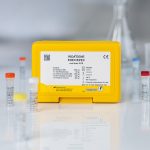Intended use:
For in vitro diagnostic use. The RIDA®GENE MRSA test, performed on the Roche LightCycler® 480 II, is a multiplex real-time PCR for the direct qualitative detection of methicillin-resistant Staphylococcus aureus (MRSA) and methicillin-susceptible Staphylococcus aureus (MSSA) DNA in untreated human nasal/throat swabs, wound swabs, and culture in asymptomatic individuals and in individuals showing signs and symptoms of infection caused by MRSA.
The RIDA®GENE MRSA Test is intended to support the diagnosis of staphylococcus infections (methicillin-resistant Staphylococcus aureus (MRSA), methicillin-susceptible Staphylococcus aureus (MSSA)) in asymptomatic individuals and in individuals showing signs and symptoms of infection caused by MRSA in connection with other clinical and laboratory findings.
Negative results do not rule out staphylococcus infection (methicillin-resistant Staphylococcus aureus (MRSA), methicillin-susceptible Staphylococcus aureus (MSSA)) and should not be used as the sole basis for diagnosis.
The product is intended for professional use.
General information:
Staphylococci are widespread as natural colonizers of the skin and mucosa of the oropharynx in humans and animals. They are divided into coagulase-positive (S. aureus) and coagulase-negative staphylococci (such as S. epidermidis). Staphylococcus aureus is one of the most significant pathogens of nosocomial infections in hospitals and other healthcare facilities. The pathogen is transmitted through medical personnel or other patients. An estimated 30% of the healthy population is colonized with S. aureus (asymptomatic carriers). Methicillin-resistant Staphylococcus aureus (MRSA) is one of the most frequent pathogens of nosocomial infections worldwide (hospital-acquired MRSA or just HA-MRSA). In addition to HA-MRSA infections, there are also community-acquired MRSA (CA-MRSA) infections that can be caught outside of the hospital. In recent years, livestock-associated MRSA or LA-MRSA infections have occurred in the context of fattening animals, in particular among pig farmers. The methicillin (oxacillin)-resistance of S. aureus is mediated by the penicillin-binding protein PBP2a, which is encoded by the chromosomal mecA gene. The mecA gene is localized on the variable and unstable SCCmec gene cassette (staphylococcal cassette chromosome mec). To date, 14 SCCmec cassette types have been described, of which types I to V occur most frequently.
The SCCmec cassette type XI (SCCmec XI), which contains another mecA homolog (also termed mecC or mecLGA251, was described for the first time in 2011. The mecC gene has only a nucleotide homology of 70% with mecA and is not detectable using normal mecA-specific PCRs and PBP2a-agglutination tests. It has been described in S. aureus isolates of humans and cattle.
In contrast to infections with MSSA (methicillin-sensitive Staphylococcus aureus), MRSA infections are associated with an elevated morbidity, mortality, extended hospital stays and greater treatment costs. Risk factors for MRSA infection in healthcare facilities are contact with patients with a MRSA infection, a known history of MRSA, the length of hospital stay and long-term antibiotic therapy.
Each MRSA infection generates up to $10,000 in additional costs. In the European Union, more than 150,000 hospital patients suffer from a MRSA infection. The resulting hospital costs to the European healthcare system are estimated at €380 million.
Early, rapid and systematic MRSA screening allows infected patients to be specifically treated and appropriate hygiene methods to be introduced to prevent the transmission and spread of MRSA.
Using conventional culturing methods, 48 to 72 hours are needed to detect MRSA. Real-time PCR tests allow early and fast MRSA screening on the date of hospital admission as part of the infection prevention program (“search and destroy” strategy).
Advantages
- Detection and differentiation of MRSA, MSSA and methicillin-resistant coagulase-negative Staphylococci
- Mutiplexing Real-time PCR: S. aureus (SA442), SCCmex/orfX junction and mecA/mecC gene
- Fast lysis possible
- PCR results in less than 1,5 hours
- Ready-to use reagents
- Harmonized Workflow and PCR profile allows parallel processing of multiple RIDA®GENE assays (DNA and RNA assays)
- All components included, also Lysis Buffer, Internal Control, Positive Control and Negative Control
- Simplified sample analysis through RIDA®SEEK Software
| Art. No. | PG0605 |
|---|---|
| Test format | 100 reactions |
Dear customers,
we have started to provide the documents for our products in an electronic format. These are the Instructions for Use (IFU), the Safety Data Sheets (SDS) and the Certificate of Analysis (CoA). For batches placed on the market after 01 January 2023, you can find our documents on the eIFU portal eifu.r-biopharm.com/clinic.










